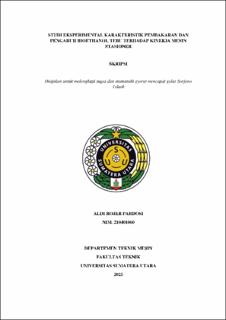Studi Eksperimental Karakteristik Pembakaran Dan Pengaruh Bioethanol Tebu Terhadap Kinerja Mesin Stasioner
Experimental Study Of Combustion Characteristics And The Effect Of Sugarcane Bioethanol On The Performance Of A Stationary Engine

Date
2025Author
Pardosi, Aldi Rojer
Advisor(s)
Sitorus, Tulus Burhanuddin
Metadata
Show full item recordAbstract
Increasing carbon emissions from the transportation sector have driven the search for more environmentally friendly alternative fuels. Sugarcane bioethanol stands out as a potential renewable energy solution, particularly for Indonesia. In this study, I experimentally analyzed the effect of sugarcane bioethanol on the performance and combustion characteristics of a stationary engine. Furthermore, this research compares its performance against commercial gasoline fuels (RON 90, 92, and 98) commonly used in Indonesia. The experiment was conducted on an engine under no-load conditions with speeds varying from 1500 to 4000 RPM, where cylinder pressure and combustion parameters were analyzed using a Kistler data acquisition system. The results indicate that the engine performance using sugarcane bioethanol (RON 95) was highly competitive and showed no significant difference compared to commercial gasoline. Specifically, bioethanol produced a slightly lower peak pressure but exhibited a longer and more controlled combustion duration, which is characteristic of high-octane fuels. The resulting power and torque were comparable, especially at high engine speeds, proving that bioethanol can be used without a meaningful sacrifice in performance. Therefore, it is concluded that sugarcane bioethanol is a highly viable alternative fuel to support Indonesia's energy diversification program towards more sustainable energy sources.
Collections
- Undergraduate Theses [1014]
